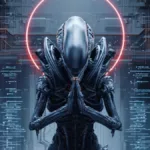The dream of cheating death is as old as civilization itself. It is a thread woven through our most ancient stories, a fundamental human desire that has driven kings, alchemists and explorers for millennia. One of the earliest recorded examples is the Epic of Gilgamesh, in which a Mesopotamian king, devastated by the death of his friend, embarks on a harrowing journey to find the secret to eternal life. He ultimately fails, learning that mortality is the inescapable fate of humankind.
This quest continued through the ages. Ancient Egyptian pharaohs built monumental tombs and perfected mummification in a bid to secure their place in the afterlife. China’s first emperor, Qin Shi Huang, was famously obsessed with finding an elixir of life, a pursuit that may have ironically shortened his life due to mercury poisoning. European alchemists spent centuries trying to create the philosopher’s stone, a mythical substance believed to be capable of turning lead into gold and granting immortality. For nearly all of human history, this quest has been the stuff of myth, magic and religion. But today, it has moved from the realm of alchemy to the laboratory, and the new philosopher’s stone is artificial intelligence.
The Digital Alchemist: AI in the Modern Quest
The biological process of aging is staggeringly complex, involving trillions of cells and countless genetic, epigenetic and environmental interactions. It is a puzzle of such immense scale that the human mind alone cannot possibly comprehend it all. This is where AI has become the most powerful tool in the history of longevity research. By leveraging machine learning and deep learning, scientists can now analyze vast datasets at a speed and scale previously unimaginable.
AI is revolutionizing the field in several key ways:
- Drug Discovery and Repurposing: AI platforms can screen billions of molecular compounds to identify potential anti-aging drugs in a fraction of the time it would take with traditional methods. Companies like Insilico Medicine are using generative AI to design novel molecules from scratch that target the key pathways of aging. In a recent study, AI was used to identify existing drugs that could be repurposed, with over 70% of the top candidates successfully extending the lifespan of worms in lab tests.
- Identifying Biomarkers of Aging: AI algorithms are being trained to identify the subtle molecular and cellular signatures of aging, creating “aging clocks” that can accurately measure a person’s biological age, as opposed to their chronological one. This allows researchers to quantify the effectiveness of anti-aging interventions and develop personalized longevity plans.
- Understanding the Fundamental Biology: Well-funded research labs like Google’s Calico and Jeff Bezos’s Altos Labs are using advanced computing and AI to tackle the core biological questions of why and how we age, aiming to develop interventions that can lead to healthier, longer lives.
The Dawn of Digital and Biological Immortality
As AI continues to accelerate our understanding of biology, the question is no longer if we can extend human lifespan, but by how much, when and in what form. Two primary paths to a kind of immortality are now being seriously discussed: biological and digital.
Biological immortality involves halting or even reversing the aging process at the cellular level. This would not mean you couldn’t die from an accident or disease, but that your body would no longer deteriorate simply due to the passage of time. While this sounds like science fiction, the rapid progress in gene editing, cellular reprogramming and AI-driven therapies is making this a plausible long-term goal.
Digital immortality, on the other hand, involves the concept of mind uploading—transferring a person’s consciousness from their biological brain to a digital substrate. This would allow an individual’s personality and memories to exist indefinitely in a virtual environment or a robotic body. Futurists like Ray Kurzweil have made bold predictions, suggesting that we will be able to achieve a form of digital immortality by 2045.
So, when is this likely to happen? Achieving absolute, undeniable immortality is likely still centuries away. However, achieving radical life extension—where we add more than one year to our life expectancy for every year that passes—could be much closer. Many experts believe that within the next few decades, we will have therapies that can significantly slow aging, pushing the average healthy lifespan to 120 years or more. The first “immortals” may not be people who cannot die, but people who are the first to benefit from a continuous stream of AI-developed therapies that constantly repair and rejuvenate their bodies, keeping them one step ahead of decay.
Wrapping Up
The human quest for eternal life has journeyed from the pages of ancient epics to the servers of AI research labs. For millennia, it was a dream fueled by hope and superstition. Today, it is a scientific endeavor driven by data and computational power. While the specter of death will likely hang over humanity for the foreseeable future, AI has fundamentally changed the nature of the fight. It has given us the tools to understand, and perhaps one day control, the very biology of aging. The elixir of life may remain a myth, but a future of radically extended, healthier lifespans is slowly but surely becoming a scientific reality.








